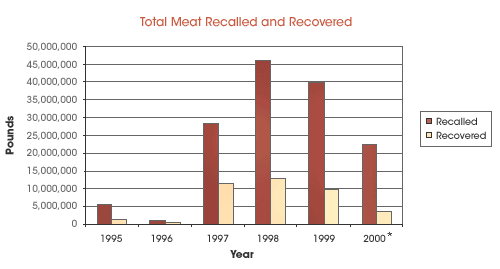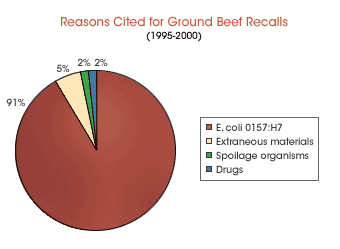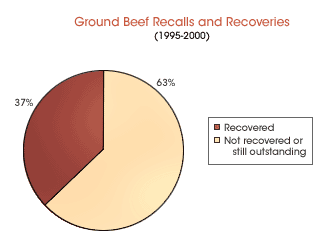|
Of the 140 million pounds of adulterated meat that the USDA recalled between 1995 and 2000, less than 30 percent was ever recovered in the recalls that have been completed. Nine times out of 10, when ground beef was recalled during that same period, it was because the potentially dangerous E. coli O157:H7 bacterium had been detected. Here's a brief overview of some of the issues governing the USDA's recall authority.

* Some of the recalls initiated in 2000 are still in progress, so numbers are tentative.
* SOURCE: Data compiled from the USDA's Food Safety and Inspection Service Recall Information Center.

Both the U.S. Department of Agriculture (USDA), which inspects meat and poultry, and the Food and Drug Administration (FDA), which inspects all other foods, have the authority to issue food recalls. But some have argued that the federal government's power to protect the food supply is much too weak, especially give that complying with recalls is at the food companies' discretion.
"It's incredible to me that the federal government can order the recall of a stuffed animal with a glass eye that could come off and choke a child, but that the federal government cannot order the recall of thousands of pounds of contaminated ground beef that could kill a child," says Eric Schlosser, author of Fast Food Nation. "If you look at the press releases whenever there's a recall, these companies make very clear that it's a voluntary recall."
"Companies always have complied," says Elsa Murano, undersecretary of food safety at the USDA. "Let's say that there's one company out there that decides, 'I'm not going to do it [the recall].' We have detention authority. We have seizure authority by law, not to mention the fact that we can certainly put out a press release and certainly companies don't want to have bad press."
Often, even if the USDA does issue a recall, the contaminated meat and poultry is never recovered, which means that consumers are probably buying it and consuming it. Between 1995 and 2000, the USDA initiated 275 recalls for meat products, for a total of more than 140 million pounds of meat. Of all the recalls that have been completed, less than 30 percent of the contaminated meat has been recovered. (See the above chart for a year-to-year breakdown of recalls versus recoveries.)
Indeed, nearly two-thirds of the ground beef that was recalled between 1995 and 2000 has never been recovered or is still outstanding, and more than 90 percent of those recalls were for E. coli O157:H7, a potentially deadly bacteria. (See the charts below. Also see "Food-borne Illnesses" for more information on pathogens commonly found in the meat supply.)


* SOURCE: Data compiled from the USDA's Food Safety and Inspection Service Recall Information Center.


* SOURCE: Data compiled from the USDA's Food Safety and Inspection Service Recall Information Center.

home + industrial meat + interviews + the politics of meat + is your meat safe? + the inspection system
inside the slaughterhouse + producer chat + introduction + discussion + video
tapes & transcripts + press reaction + credits + privacy policy
FRONTLINE + wgbh + pbsi
web site copyright WGBH educational foundation
 |